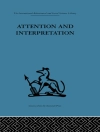This best-selling, practical, evidence-based guide to the cognitive behavioural approach takes you step-by-step through the process of counselling, from initial contact with the client to termination and follow up. The book follows a skills-based format based around the Bordin and Dryden model of bonds, goals, tasks and views, with expanded case material to further illustrate links between theory and practice.
This third edition includes new content on:
· the working alliance – what it is and why it is so important
· challenges and pitfalls in the counselling process
· when to challenge and when not to challenge clients beliefs
· emotional problems such as shame, guilt and jealousy as well as anxiety, depression and anger.
Drawing on their own extensive experience and contemporary research, the authors provide a concise overview of the cognitive behavioural approach, with new material on emotional problems rarely covered in practitioner guides, a strong emphasis on the therapeutic alliance, and updated bibliographic references throughout.
Praise for the Previous Edition:
‘An elegant and informative guide to the practice of cognitive behavioural counselling … recommended for all CBT practitioners.’ – Mick Power, Professor of Clinical Psychology, University of Edinburgh
‘A deserved best-seller for over 20 years. Peter Trower and colleagues have completely revised and updated the book in light of the enormous scientific achievements of CBT in this time. This brilliant book is essential reading for all cognitive behavioural practitioners.’ – Max Birchwood, Professor of Youth Mental Health, University of Birmingham
?‘An absolutely wonderful book on cognitive behavioural counselling. It includes not only the basic information but also recent conceptual advances in the field. Truly, I cannot recommend this book highly enough!’ – E. Thomas Dowd, International Editor, Journal of Cognitive Psychotherapy
قائمة المحتويات
Introduction to Cognitive Behavioural Counselling
A BASIC GUIDE TO COGNITIVE BEHAVIOURAL COUNSELLING
Structure and Outline of the Basic Guide
Preparation Stage I – Breaking the Ice: Screening, First Meeting, Establishing a Bond
Preparation Stage II – Will this Help? Clarifying Problems, Goals, the Cognitive Approach, Commitment
Beginning Stage I – What’s the Problem Specifically? Cognitive Assessment of a Specific Example
Beginning Stage II – What Are We Aiming For? New Thinking, Feeling and Action Goals
Middle Stage I – Getting Realistic: Challenging and Changing Inferences
Middle Stage II – Changing Hot Thoughts
Middle Stage III – Imagery Rescripting
Middle Stage IV – Working Through
Middle Stage V – Dealing with Pitfalls in CBC Counselling
Ending Stage – Coaching the Client To Become His Own Counsellor
APPLYING CBC TO EMOTIONAL PROBLEMS
Anxiety
Depression
Anger
Guilt
Shame
Hurt
Envy
Jealousy
From Theory to Practice and Further Development
APPENDICES: CLIENT’S GUIDES AND WORKSHEETS FOR CBC
Appendix 1: Preparation Guide
Appendix 2: Assessment and Goal Planning Guide
Appendix 3: Options for Change Guide
عن المؤلف
Jason Jones is a Consultant Clinical and Forensic Psychologist in the NHS and Course Director at the Centre for REBT at the University of Birmingham.












